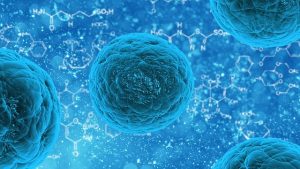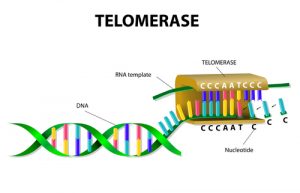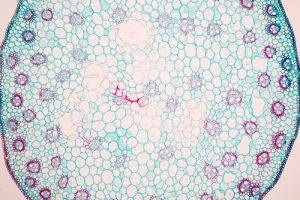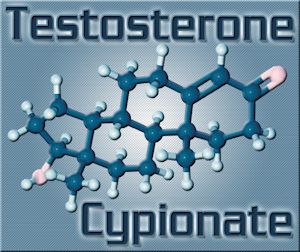
What are Telomeres, and what do they have to do with longevity?
In any living organism, including humans, cells divide (or split) into a higher number of cells.
This is how our bodies maintain themselves and heal themselves from injury. Within cells are chromosomes. Our DNA patterns are primarily found in chromosomes. Telomeres are located on the ends of chromosomes.
They keep the chromosomes from deteriorating, among other things. However, telomeres themselves degrade over time. In the early stages of life, telomeres are long, and they are shortened as a human gets older.
When a telomere becomes too short, the cell is no longer able to divide and produce new cells. Instead, it begins to deteriorate and will eventually die.
Video Link: https://vimeo.com/290611197
Video Download: Click Here To Download Video
Video Stream: Click Here To Stream Video
In short, the longer the telomere is, the better able the body is to maintain itself on a cellular level. When telomeres become too short, the body begins to degrade.
What is Telomerase?
Enzymes are responsible for chemical reactions on a cellular level. Telomerase is  an enzyme that can work to increase the length of telomeres.
an enzyme that can work to increase the length of telomeres.
However, note that telomeres can sometimes become too long. When this happens, it can result in cancer and various tumors.
When telomeres are a good length (not too long or short), optimal health is promoted.
What are Stem Cells?
Stem cells are unique because they can split into other cells that are not specialized. In other words, most cells divide into the same kind of cell as it was before. Stem cells, on the other hand, can split into many different types of cells.
This makes them ideal for medical research, because they could be used (and have been used) in many different ways for many different purposes.
What is Stem Cell Research?
Now that we’ve provided this background information let us address the practical application in the United States of America.
 Stem cells were discovered by Dr. James Till and Dr. Ernest McCulloch in 1961.
Stem cells were discovered by Dr. James Till and Dr. Ernest McCulloch in 1961.
They realized that harnessing the regenerative power of stem cells could lead to many treatments for various diseases and injuries.
Stem cells are present in adults as well as children and preborn children, and research was (and is) done on both adult and embryonic stem cells. In the 1970s in the USA, guidelines were established that allowed for experimentation on human fetal tissue, although such practices had already been happening.
President Ronald Regan later fought against this by stopping the funding of human embryo research by the government.
Stem Cell Research Today
Today, both adult and embryonic stem cell research are still practiced. It’s still relatively new, and there’s a great deal of excitement about the many developments that have come from it, but there is also a lot of concern and disagreement within the medical community when it comes to embryonic research.
Embryonic stem cell research begins with IVF (In Vitro Fertilization), which produces a large number of embryos, often dozens at a time. These human embryos, after being harvested for stem cells, are killed and discarded.
For this reason, many people argue that adult stem cell research is not only preferable but the only ethical and moral way to continue.
And while there is validity to the argument that stem cells harvested from unborn humans are ideal because they have the longest telomeres, people who make such cases generally see the goal for improved health (a laudable goal) as the most important thing, and do not concern themselves with the ethicality of their methods.
However, any result, no matter how desirable it may be, cannot justify an action that is fundamentally evil, such as ending the life of a human being. (Note that most of the developments that have come from stem cell research resulted from adult stem cell research.
Positive results of embryonic stem cell research are much fewer and less significant.)
Why Does This Matter in the World of Longevity and Anti-Aging Treatments?
The subject of telomeres and stem cell research is of particular interest to us in  Hormone Replacement Therapy (HRT). HRT provides hormone supplementation (usually through injections or creams) to people with a diagnosed deficiency of HGH (Human Growth Hormone), Testosterone, and others.
Hormone Replacement Therapy (HRT). HRT provides hormone supplementation (usually through injections or creams) to people with a diagnosed deficiency of HGH (Human Growth Hormone), Testosterone, and others.
Often, when people’s bodies age, they start to produce less of these vital hormones, which (depending on each specific person’s health) can cause problems.
People with such deficiencies often suffer from a variety of symptoms, including weight gain, muscle decline, anxiety, sleeping problems, mental health issues, fatigue, and more. HRT often helps patients to overcome and reduce such symptoms by restoring hormone balance in the body.
For people suffering from such symptoms, the process of being diagnosed and looking for the right treatment can be very hard. It’s so important to do your research on these treatments and the sciences behind them.
Trust your physician – they are certified experts who want to help you – but also test them. Ask lots of questions, and don’t use any medication or undergo any treatments unless you understand them thoroughly. After all, this is your health. Take charge of it.
The existence of telomeres is of great interest to us in the HRT and Anti-Aging world because we are always excited to find new ways to preserve health into old age, and if we can find ways to promote and maintain the length of telomeres (perhaps by finding ways to manage Telomerase), then maybe this will be another way to improve longevity and vitality, even for people who do not necessarily suffer from hormone deficiency.
(HRT is a prescription treatment that is only available to patients who meet specific criteria, as they must be explicitly diagnosed with a lack of a particular hormone.)
Contact Us Today For A Free Consultation

- Testosterone for Women [Last Updated On: December 1st, 2023] [Originally Added On: December 29th, 2013]
- Testosterone Androgen [Last Updated On: December 11th, 2023] [Originally Added On: December 29th, 2013]
- Testosterone and Body Building [Last Updated On: December 14th, 2023] [Originally Added On: December 30th, 2013]
- Testosterone Levels [Last Updated On: December 6th, 2023] [Originally Added On: December 31st, 2013]
- Testosterone Gel, Cream, and the Testosterone Patch [Last Updated On: November 28th, 2023] [Originally Added On: December 31st, 2013]
- Buy Testosterone | Types of Testosterone Replacement Therapy Programs, Injections, Cream and Gel [Last Updated On: December 13th, 2023] [Originally Added On: December 31st, 2013]
- Buy Testosterone Injections Online, Testosterone Prescription for Low T, Testosterone Replacement Therapy [Last Updated On: October 16th, 2020] [Originally Added On: January 1st, 2014]
- Aging and Testosterone Replacement Therapy [Last Updated On: December 12th, 2023] [Originally Added On: January 3rd, 2014]
- What Causes Low Testosterone [Last Updated On: December 10th, 2023] [Originally Added On: January 7th, 2014]
- Hormone Levels in Men [Last Updated On: December 4th, 2023] [Originally Added On: January 12th, 2014]
- Hormone Level Testing [Last Updated On: November 29th, 2023] [Originally Added On: January 13th, 2014]
- Types of Testosterone Products and Delivery [Last Updated On: December 8th, 2023] [Originally Added On: January 22nd, 2014]
- Testosterone Therapy Helps Men with Low-T Ward Off Prostate Cancer [Last Updated On: May 29th, 2024] [Originally Added On: December 29th, 2019]
- The Importance of Dietary Fat for Testosterone Production [Last Updated On: July 8th, 2024] [Originally Added On: January 2nd, 2020]
- Testosterone Deficiency and Low-T at Epidemic Levels Among Men in the United States [Last Updated On: May 27th, 2024] [Originally Added On: May 17th, 2020]
- The Effects of Testosterone Therapy on Male Patients -- Who Should Use Testosterone? [Last Updated On: December 20th, 2023] [Originally Added On: June 16th, 2020]
- Does Ibuprofen Contribute to Low Testosterone? [Last Updated On: January 27th, 2024] [Originally Added On: June 20th, 2020]
- The Link Between Testosterone and Lower Rates of Autoimmune Diseases Among Men [Last Updated On: January 30th, 2024] [Originally Added On: June 21st, 2020]
- Weight Cycling and the Problem with Crash Dieting [Last Updated On: April 8th, 2024] [Originally Added On: July 30th, 2020]
- Reexamining Bio-Identical Testosterone Therapy [Last Updated On: June 18th, 2024] [Originally Added On: August 12th, 2020]
- Understanding how Muscle and Fat Impact Body Mass, Weight, and Health [Last Updated On: April 15th, 2024] [Originally Added On: August 25th, 2020]
- The Role of Nitric Oxide in Cancer Proliferation And Prevention [Last Updated On: May 3rd, 2024] [Originally Added On: August 26th, 2020]
- Understanding Heartburn in the 21st Century [Last Updated On: April 24th, 2024] [Originally Added On: August 28th, 2020]
- What is Erectile Dysfunction? [Last Updated On: April 20th, 2024] [Originally Added On: August 30th, 2020]
- Sermorelin Acetate Drug Information [Last Updated On: April 7th, 2024] [Originally Added On: August 31st, 2020]
- Exercise and Mental Health [Last Updated On: April 5th, 2024] [Originally Added On: September 1st, 2020]
- The Importance of Proteins, Carbs, and Fats [Last Updated On: March 11th, 2024] [Originally Added On: September 2nd, 2020]
- Low-T Treatment Before and After -- How Testosterone Therapy Improves Vitality [Last Updated On: April 9th, 2024] [Originally Added On: September 6th, 2020]
- Changes to LabCorp Guidelines for Low-T Diagnosis and How They Impact Your Treatment [Last Updated On: July 14th, 2024] [Originally Added On: September 22nd, 2020]
- The Effects of Testosterone on Asthma Prevalence Among Men and Women [Last Updated On: February 19th, 2024] [Originally Added On: October 6th, 2020]
- 7 Exercises to Elevate Testosterone Levels [Last Updated On: June 13th, 2024] [Originally Added On: October 10th, 2020]
- Vitamin A is Essential for Good Health - Are You Getting Enough ? [Last Updated On: April 16th, 2024] [Originally Added On: October 14th, 2020]
- Testosterone and Diet – How to Support Testosterone Levels with Healthy Eating [Last Updated On: June 7th, 2024] [Originally Added On: October 29th, 2020]
- The Influence of Testosterone on Protective Mating Behaviors in Men [Last Updated On: January 25th, 2024] [Originally Added On: December 6th, 2020]
- The Role of Testosterone in Women's Health [Last Updated On: December 24th, 2023] [Originally Added On: December 7th, 2020]
- Testosterone Promotes Bone Health and Can Help Treat Osteoporosis [Last Updated On: February 15th, 2024] [Originally Added On: December 17th, 2020]
- The Relationship Between Testosterone and Cortisol [Last Updated On: April 2nd, 2024] [Originally Added On: December 19th, 2020]
- The Importance of Sex Hormone-Binding Globulin (SHBG) for Healthy Testosterone Levels [Last Updated On: March 9th, 2024] [Originally Added On: December 28th, 2020]
- 12 Health Issues That Can Kill Libido and Limit Sexual Performance [Last Updated On: May 23rd, 2024] [Originally Added On: January 3rd, 2021]
- 4 Foods to Boost Your Testosterone Levels [Last Updated On: February 7th, 2024] [Originally Added On: January 4th, 2021]
- Low Testosterone Symptoms [Last Updated On: December 31st, 2023] [Originally Added On: January 7th, 2021]
- Is Male Menopause Real? The Science of Andropause [Last Updated On: January 15th, 2024] [Originally Added On: January 11th, 2021]
- Relieve Fatigue and Increase Energy with Testosterone Replacement Therapy [Last Updated On: January 16th, 2024] [Originally Added On: January 16th, 2021]
- How to Administer a Testosterone Injection -- Low-T Injection Guide [Last Updated On: February 28th, 2024] [Originally Added On: January 17th, 2021]
- Testosterone Levels Associated with Serotonin Activity in the Brain [Last Updated On: March 26th, 2024] [Originally Added On: January 19th, 2021]
- Grumpy Old Man Syndrome – Causes and Treatments [Last Updated On: June 8th, 2024] [Originally Added On: January 22nd, 2021]
- The Effects of Beer on Testosterone Production and Gynecomastia [Last Updated On: March 21st, 2024] [Originally Added On: January 30th, 2021]
- Testosterone Frequently Asked Questions [Last Updated On: February 6th, 2024] [Originally Added On: February 26th, 2021]
- Testosterone Supplements: Vitamin and Amino Acid Pills Versus Real Testosterone [Last Updated On: November 21st, 2024] [Originally Added On: March 1st, 2021]
- Testosterone Side Effects, Risks, Dangers and Negative Effects [Last Updated On: November 7th, 2024] [Originally Added On: March 2nd, 2021]
- Testosterone for Men [Last Updated On: February 20th, 2024] [Originally Added On: April 13th, 2021]
- Testosterone Testing [Last Updated On: November 9th, 2024] [Originally Added On: May 7th, 2021]
- Hormone Replacement Therapy: Commonly Asked Questions [Last Updated On: February 20th, 2024] [Originally Added On: June 16th, 2023]
Word Count: 962




















